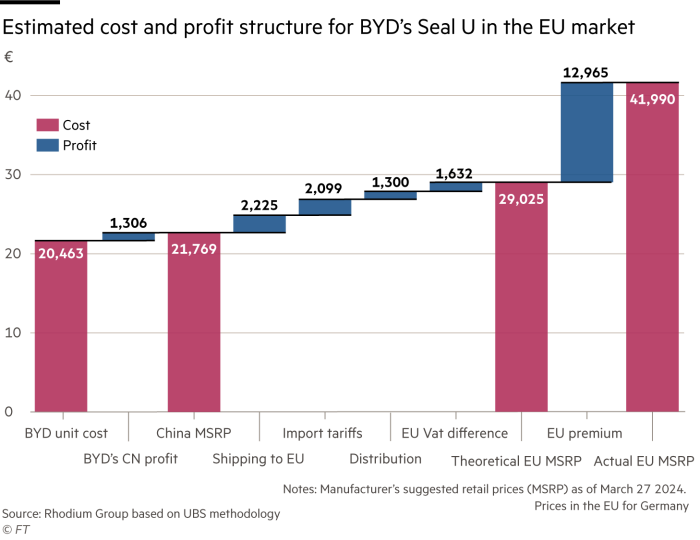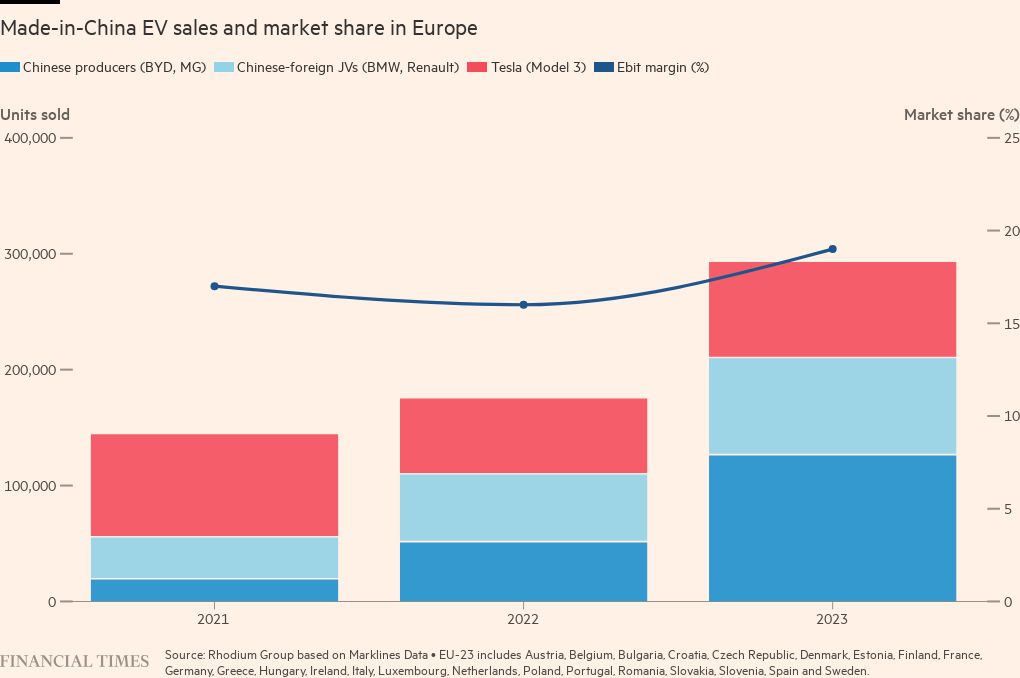Stay informed with free updates
Simply sign up to the Electric vehicles myFT Digest — delivered directly to your inbox.
The EU would need to impose huge tariffs of about 50 per cent to stem the flow of cheap Chinese electric vehicles into the bloc, according to new analysis.
Brussels’s blockbuster anti-subsidy investigation into Chinese electric cars is expected to conclude within weeks, but researchers at the Rhodium Group say any punitive action is likely to be too timid to deter Chinese carmakers.
“We expect the European Commission to impose duties in the 15-30 per cent range. But even if the duties come in at the higher end of this range, some China-based producers will still be able to generate comfortable profit margins on the cars they export to Europe because of the substantial cost advantages they enjoy,” the report says.
“Duties in the 40-50 per cent range — arguably even higher for vertically integrated manufacturers like BYD — would probably be necessary to make the European market unattractive for Chinese EV exporters.”
BYD’s Seal U, for example, sells for €20,500 in China and €42,000 in the EU. The estimated profit is €1,300 and €14,300 respectively, giving a strong incentive to export, Rhodium says.
Imports already pay a 10 per cent EU tariff rate, amounting to roughly €2,100 a vehicle.
“According to our calculations, a 30 per cent duty would still leave the company with a 15 per cent (€4,700) EU premium in relation to its China profits, meaning that exports to Europe would remain highly attractive,” the Rhodium report said.

BYD could even lower its prices to hit its target of capturing 5 per cent of the EU market by 2025 and 10 per cent by 2030, the report says. “Many other Chinese EV models would still enjoy a strong EU profit premium.”
Rhodium calculated that the average punitive duty across all sectors where the EU has found subsidies is 19 per cent, if the affected companies co-operate, as Chinese carmakers BYD, SAIC and Geely have done.
Brussels announced its investigation in October after a surge in imports threatened domestic producers that are switching from combustion engine vehicles to electric ones.
Imports of EVs from China, including from non-Chinese manufacturers with plants there, increased from $1.6bn in 2020 to $11.5bn in 2023. The market share of Chinese brands rose more than fourfold in that time to 8 per cent last year.
That is set to hit 11 per cent this year, rising to 20 per cent by 2027, according to estimates from Transport & Environment, an NGO.
German and US carmakers, which manufacture in China and sell in the EU, are also vulnerable to higher tariffs. Rhodium says 15 per cent duties would wipe out profits for Tesla’s exports from China to the EU.
Beijing has denounced the investigation as protectionist, saying its companies are simply more competitive.
EU officials told the FT that preliminary duties could come as early as May, although the deadline is July. Permanent duties would have to win the support of a majority of EU member states, and would be imposed in November.
Rhodium said massive investment in factories meant that Chinese carmakers were obliged to export to make a satisfactory return.
By 2026, BYD’s annual production capacity in China will reach 6.6mn EVs up from 2.9mn at the end of 2023. To absorb that capacity domestically BYD would need to more than double its sales in a slowing market.
With countries including the US already imposing tariffs and restrictions, the EU has become the market of choice.
Rhodium predicts that EU policymakers in Brussels could use other means to protect domestic industry. They could restrict Chinese imports on security grounds, given how much data the vehicles collect, or focus consumer subsidies for electric vehicles on EU-made models.
The European Commission said it would complete inspection visits by the end of April and was “assessing the verified data and information”.








